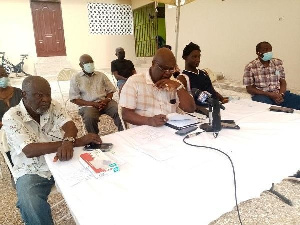McCarthy Hill residents threaten court action if cement factory project is not stopped

President of the McCarthy Hill Residents Association, Mr. Eddie Quaynor, has disclosed the association will have no option than to head straight to court for an injunction to stop the new cement factory currently under construction in the area if authorities do not ensure its closure.
Mr. Quaynor informed that several petitions have been sent to the Environmental Protection Agency (EPA) and although their grievances were welcomed with grave concern nothing has yet been done to stop works at the factory.
The McCarthy Hill Residents Association recently held a press conference to protest against the siting of a cement factory named ‘Empire Cement’ at South McCarthy Hill along the main road leading to Weija.
Mr. Quaynor said they will utilize all legal means to ensure the factory does not see the light of the day as its operation will be too hazardous to the health and well-being of residents at McCarthy Hill, Tetegu, Mallam, Gbawe and Weija.
“We want to have a peaceful and serene environment, free of constant cement dust particles in the air as the wind direction blows over the cement factory area in the direction of the catchment areas mentioned.
Mr. Quaynor observed that even more worrying is the fact that the site of the cement factory is next to Panbros Salt Industries Ltd., the oldest and largest wholly-Ghanaian owned salt company that produces quality salt for the whole country and the West African sub region.
Mr. Quaynor said the Environmental Protection Agency (EPA) had confirmed in its correspondence to Empire Cement that edible salt and a cement factory do not mix and that the two land-uses were mutually exclusive and must be completely separated.
He said the factory owners had disregarded several warnings from the EPA to cease operations and instead were working day and night to speed up the construction of the factory and that they had installed three aluminum silos so far and were excavating and filling up the low-lying areas.
He said McCarthy Hill residents supported the one district, one factory concept and would welcome the creation of jobs in Ghana, and good initiatives for building factories according to well thought out land-use planning and law.
He added that proper land-use planning would ensure that the health and safety of the residents were protected.
He said their major concern was that the factory was being built even though there was no preliminary approval from (EPA) the statutory body in charge of assessing, granting approval, and monitoring such factories that impact the environment negatively.
Mr. Quaynor said cement factories by their nature were classified under heavy industry as it generated heavy duty air pollution that required sitting in heavy industrial areas, away from heavily populated or densely residential areas.
He said the production process of packaging cement disclosed in a document from Empire Cement involved four big warehouses with each warehouse carrying separate projects namely, Clinker, Gypsum, Pozzolana, and Cement Grinding Aid.
The president said the above production processes pointed to heavy industry which must be in a heavy industrial zone, away from the densely populated residential areas mentioned.
He said the Empire Cement owners had avoided any engagement with the residents about the health hazards on residents, especially children and the elderly and they were shocked to see the extent of construction that had occurred without their knowledge.
Mr. Quaynor said the cement particles which resulted from bagging 40,000 metric tons of cement per month, was a major environmental concern to the health of residents at McCarthy Hill and its environs.
Source: Ohene Adjei, Conributor






